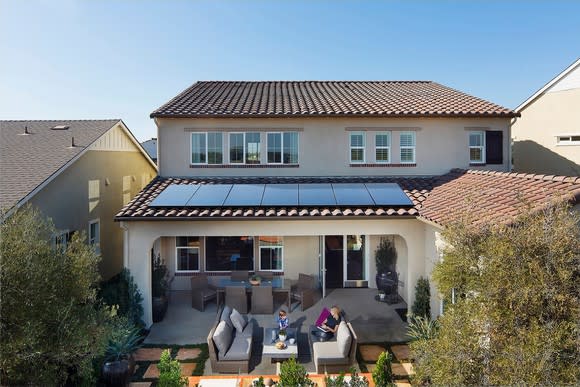Why Micro Inverters Are Used in Residential Solar
There's a constant debate in the solar industry over whether residential solar systems should use power optimizers on each panel and a central string inverter or a micro inverter on each panel. New regulations mandate that module-level power electronics are necessary, so one of the two systems will be used in most installations in the U.S. today. But which one is better?
Micro inverters aren't the most common choice, but Enphase Energy (NASDAQ: ENPH) and SunPower Corporation (NASDAQ: SPWR) are betting on the technology in their solar businesses. Here's where they see the advantage of micro inverters right now.

Image source: SunPower.
No regular replacements
String inverters need to be replaced every 10 to 15 years, adding cost and the inefficiency of maintenance to solar systems that use them. Micro inverters from Enphase and SunPower both have 25-year warranties, something string inverters don't have. SolarEdge (NASDAQ: SEDG) offers a warranty extension, but that'll cost a homeowner anywhere from $120 to $1,239 depending on the inverter.
If you're looking for a low maintenance solar product, micro inverters may be the way to go.
Safer low voltage
Micro inverters convert DC to AC current at the module, which is safer for workers and homeowners. Solar modules can generate a voltage of as high as 1,000 V on a roof whereas a micro inverter lowers that to 60 V and is in the safer AC current.
Depending on the value homeowners put on safety, micro inverters may be an attractive option for their roof.
Lower cost
In some cases, micro inverters can lower the cost of installation. For example, SunPower's Equinox system for residential solar systems comes with panels that have the micro inverter installed at the factory. It's far more efficient to install components at the factory than it is on the site of an installation, where most power optimizers are installed.
This can lower the cost of the panel and module level electronics and make installation itself easier, which is where a lot of the cost resides in residential solar systems. That makes integrated micro inverters attractive for some companies.
Are micro inverters the future of residential solar?
Micro inverters and power optimizers go back and forth in popularity among solar installers, but there are good reasons micro inverters will continue to play a role in the future of residential solar. They're reliable, safe, and can lead to lower costs than power optimizers and string inverters. Those are attractive advantages for a lot of homeowners looking to go solar.
From an investor perspective, the battle between different power electronics has left Enphase Energy struggling financially, a sign of how competitive the market is. But SunPower's residential market share and margins are on the rise, so investors shouldn't write off micro inverters as a differentiator financially long-term.
More From The Motley Fool
6 Years Later, 6 Charts That Show How Far Apple, Inc. Has Come Since Steve Jobs' Passing
Why You're Smart to Buy Shopify Inc. (US) -- Despite Citron's Report
Travis Hoium owns shares of SunPower. The Motley Fool has no position in any of the stocks mentioned. The Motley Fool has a disclosure policy.

 Yahoo Finance
Yahoo Finance 